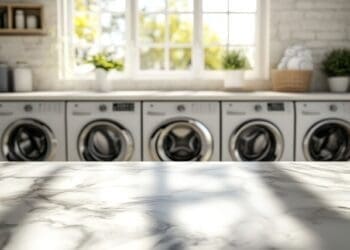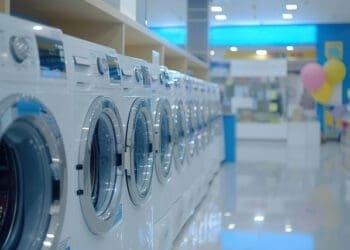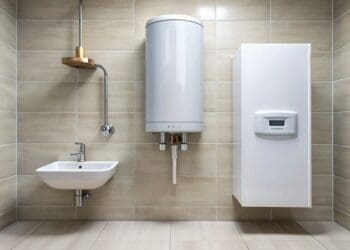Did you know that hard water affects over 80% of homes in the U.S., leading to expensive plumbing and appliance repairs? Indeed, many of us are unknowingly spending thousands on unnecessary maintenance costs when smart home water filters could be the solution.
We’ve discovered that modern water filtration systems do more than just provide clean water. For instance, households using these advanced systems save up to 70% on detergents and soaps, while increasing water heater efficiency by up to 29%. Furthermore, salt-free water conditioners can extend appliance life by up to 30%, significantly reducing replacement and repair costs.
In this article, we’ll explore how smart water filtration technology can protect your home’s plumbing system, extend appliance life, and ultimately save you over $1,000 yearly in maintenance costs.
Smart Water Filter Features That Cut Costs

Smart home water filters now come equipped with advanced features that actively prevent costly water damage. These intelligent systems primarily focus on three key areas that deliver substantial cost savings.
Real-time leak detection saves $500+ in repairs
Modern water filtration systems include sophisticated leak detection technology that monitors your home’s plumbing 24/7. These systems detect leaks as small as a single drop per minute, enabling early intervention before minor issues become major problems. Studies show that 60% of homeowners discover unknown leaks within 30 days of installation. The automatic shut-off feature activates in less than five seconds when leaks are detected, consequently preventing flooding and expensive water damage.
Automated filter change alerts prevent system damage
Smart water filters now incorporate intelligent monitoring systems that track filter life cycles. These systems send notifications through mobile apps when filters need replacement. Additionally, the technology runs daily tests to identify potential system issues, protecting your investment by preventing damage from worn-out filters. The automated alerts ensure optimal filter performance and extend system lifespan.
Water usage monitoring reduces waste by 30%
Advanced monitoring capabilities help track water consumption patterns throughout your home. Notable features include:
- Real-time water flow analysis
- Fixture-specific usage tracking
- Pressure monitoring for pipe health
- Temperature sensors for freeze prevention
These monitoring systems have demonstrated remarkable results, with households reducing water consumption by up to 20%. The technology identifies abnormal usage patterns and sends immediate alerts about potential issues. Consequently, homeowners can address problems promptly, preventing waste and avoiding unnecessary expenses. The system’s ability to distinguish between normal usage and potential problems ensures you only receive relevant alerts, making water management more efficient and cost-effective.
Reduced Appliance Maintenance Expenses

Water filtration systems deliver substantial savings through extended appliance lifespans and reduced maintenance needs. Let’s examine how these systems protect your major household investments.
Extended water heater lifespan
A water heater’s efficiency typically declines due to mineral buildup, primarily from hard water. Studies show that water heaters using softened water maintain their original factory efficiency rating for up to 15 years. Initially, unfiltered hard water can reduce heating efficiency by up to 48%. Moreover, scale accumulation forces water heaters to work harder, increasing energy costs by 14-25%.
Smart filtration systems prevent these issues by removing minerals before they enter your water heater. This proactive approach helps maintain optimal performance and prevents damage to heating elements. Notably, tankless water heaters using unfiltered hard water have failed in as little as 1.6 years, making filtration essential for protecting these investments.
Lower dishwasher repair frequency
Dishwashers face multiple challenges from poor water quality that can lead to frequent repairs. Here are the primary ways filtration systems extend dishwasher life:
- Prevent scale buildup on heating elements
- Reduce mineral accumulation in pipes and components
- Protect moving parts from corrosion and wear
- Lower energy consumption by maintaining efficient operation
Subsequently, filtered water helps dishwashers maintain optimal cleaning performance while reducing strain on internal components. Research indicates that scale accumulation on dishwasher heating elements acts as insulation, requiring longer running times and more energy to achieve proper water temperature. By removing these harmful minerals, filtration systems help prevent premature component failure and reduce the frequency of repairs.
Monthly Utility Bill Reductions

First of all, installing smart water filtration systems leads to substantial reductions in monthly utility expenses through multiple channels. Let’s examine these savings in detail.
15% decrease in water consumption
Smart metering systems track water usage patterns in real-time, enabling precise consumption monitoring. According to studies, households equipped with smart water meters reduce their water usage by up to 30%. In particular, these systems identify excessive water consumption and wasteful habits, allowing homeowners to make immediate adjustments. As a result, families save approximately $350 annually on water costs.
Energy savings from efficient appliances
Water filtration systems specifically enhance appliance performance, leading to significant energy savings. ENERGY STAR qualified washing machines paired with filtered water use 30% less water and consume half as much energy as conventional washers. These advanced systems allow clothes to be washed effectively in cold water, eliminating the need for energy-intensive hot water cycles.
Reduced detergent and soap usage
The Water Quality Association reports remarkable savings in cleaning product consumption through water filtration. Here’s how the savings break down:
- Laundry detergent usage decreases by up to 50%
- Dishwasher soap requirements drop by more than 50% in hard water areas
- Cold water washing with soft water removes stains better than hot water with hard water
The combination of filtered water and reduced detergent usage delivers superior cleaning results. Studies demonstrate that softened water using 30% less detergent cleans as effectively as hard water, with savings increasing to 70% in areas with very hard water. These reductions in cleaning product usage translate to immediate monthly savings on household expenses.
Smart Monitoring Prevents Major Repairs

First and foremost, modern home water filters incorporate advanced monitoring systems that act as vigilant guardians of your plumbing infrastructure. These sophisticated systems utilize IoT sensors to protect your home from costly repairs.
Early warning system for pipe issues
Smart leak detectors scan your plumbing system continuously for potential problems. These devices detect changes in moisture levels and water flow patterns. Primarily, when issues are discovered, the system sends immediate alerts to your mobile device, allowing swift action even when you’re away from home. A single leaky faucet wastes up to 2,700 gallons annually, making early detection crucial for conservation and cost savings.
Pressure monitoring prevents bursts
Excessive pressure ranks among the leading causes of pipe failures. Smart monitoring systems track pressure levels throughout your plumbing network, offering these essential safeguards:
- Real-time pressure readings
- Automatic shut-off when dangerous levels are detected
- Continuous analysis of consumption patterns
- Early identification of potential weak points
Studies show that proper pressure monitoring and management can reduce pipe bursts by 35%. Essentially, these systems adjust network pressure automatically, extending equipment lifetime and preventing costly emergencies.
Water quality alerts prevent corrosion
Water quality monitoring serves as a critical defense against pipe corrosion. The system tracks pH levels and mineral content, alerting homeowners before corrosive conditions develop. Furthermore, smart filters add protective elements like orthophosphate, which creates a defensive coating inside pipes. This proactive approach helps maintain optimal pH ranges between 7.0 and 8.0, significantly reducing the risk of metal dissolution and subsequent pipe damage.
Conclusion
Smart home water filtration systems prove their worth through substantial cost savings and enhanced home protection. Our research shows these systems pay for themselves within the first year through reduced maintenance costs and utility savings.
Looking at the numbers, homeowners save over $1,000 annually through multiple benefits:
- $500+ from prevented water damage
- 30% reduction in water waste
- 50% decrease in cleaning product usage
- Extended appliance lifespans
- Lower energy consumption
Real-time monitoring capabilities stand out as game-changers for home maintenance. These systems detect issues before they become expensive problems, while automated alerts ensure optimal performance throughout the year.
Most importantly, smart water filters protect your entire home’s infrastructure. Water heaters last longer, dishwashers run more efficiently, and plumbing systems stay healthier – all while delivering cleaner, better-tasting water for your family.
Smart water filtration technology represents a practical investment that keeps delivering value year after year. Between the immediate cost savings and long-term protection of your home’s vital systems, these advanced filters prove essential for modern homeowners focused on efficiency and savings.
FAQs
Q1. How much can I save annually with a smart home water filter?
Smart home water filters can save you over $1,000 annually through reduced maintenance costs, lower utility bills, and extended appliance lifespans. This includes savings from prevented water damage, reduced water waste, decreased cleaning product usage, and lower energy consumption.
Q2. What are the key features of smart water filters that help cut costs?
Smart water filters offer real-time leak detection, automated filter change alerts, and water usage monitoring. These features can prevent costly water damage, ensure optimal system performance, and reduce water waste by up to 30%.
Q3. How do smart water filters extend appliance lifespans?
By removing minerals and contaminants, smart water filters prevent scale buildup in appliances like water heaters and dishwashers. This helps maintain their efficiency, reduces wear and tear, and can extend their lifespan by up to 30%.
Q4. Can smart water filters really reduce my monthly utility bills?
Yes, smart water filters can lead to significant reductions in monthly utility expenses. They can decrease water consumption by up to 15%, improve appliance energy efficiency, and reduce the need for detergents and soaps by up to 50%.
Q5. How do smart water filters prevent major plumbing repairs?
Smart water filters incorporate advanced monitoring systems that provide early warnings for pipe issues, monitor water pressure to prevent bursts, and track water quality to prevent corrosion. These features can help identify and address potential problems before they become costly repairs.

















